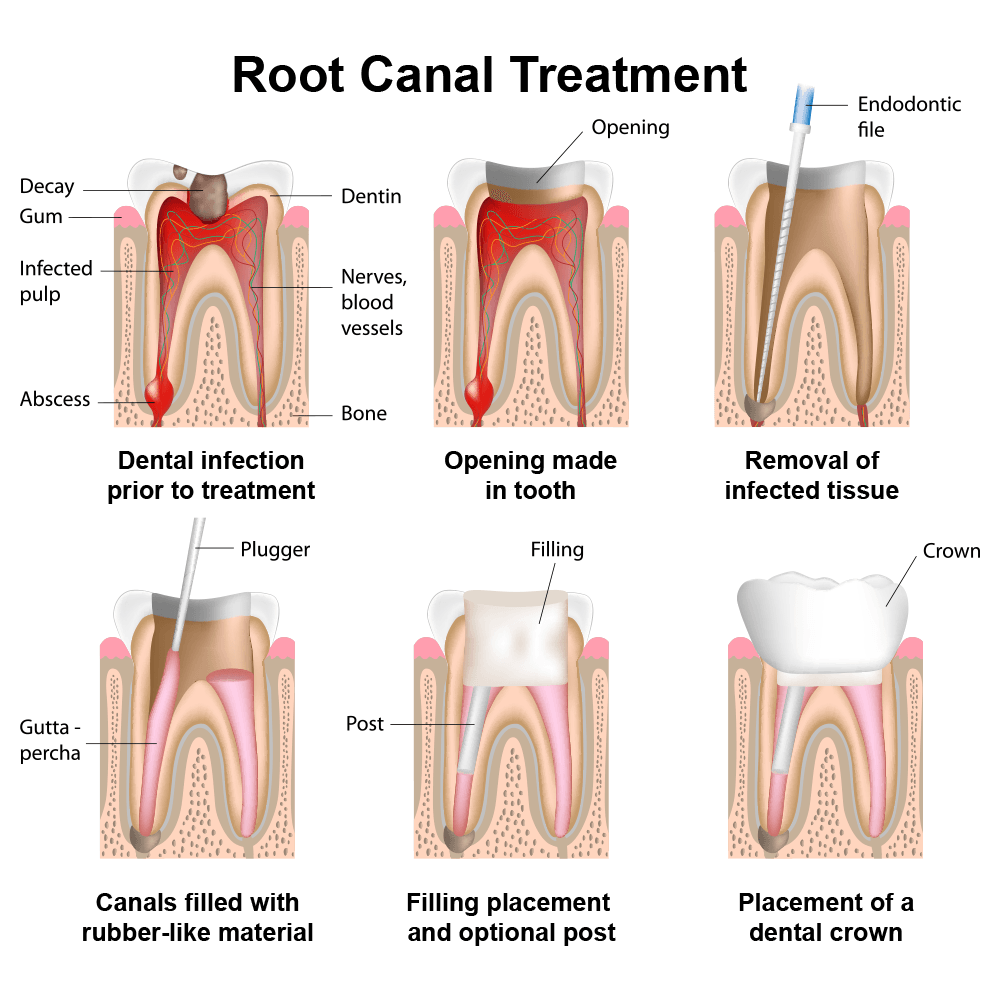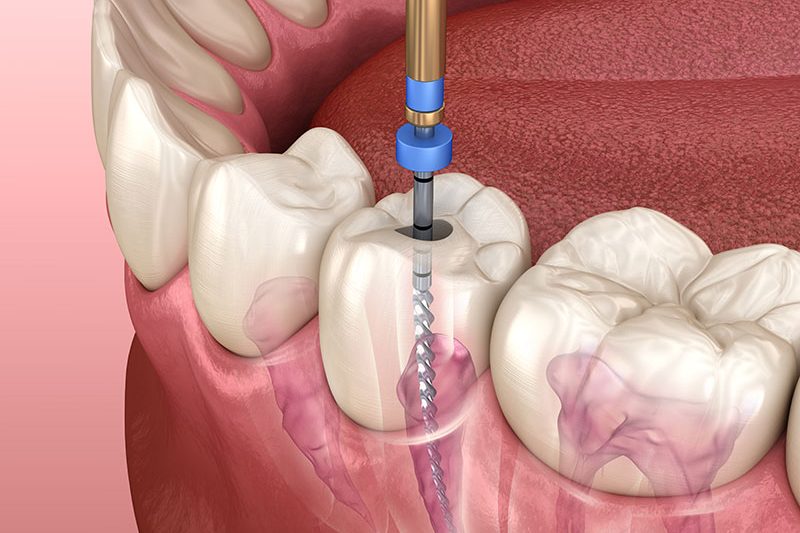Table of contents
Root canal therapy is necessary when the nerve and pulp become inflamed or infected due to deep decay; repeated dental procedures on one tooth; large fillings; cracks or chips in the tooth; or trauma sustained to the face.
Some individuals may experience a salty taste in their mouth after having root canal treatment, which should only last temporarily and can usually be alleviated with over-the-counter painkillers.
Side Effects of Root Canal Treatment
Side effects of root canal treatment vary, but common ones include:
- Tooth discoloration: Nerve removal can lead to slight discoloration.
- Reduced tooth function: Removal of infected pulp can affect function.
- Sensitivity: Normal for a few days, managed with pain relievers.
- Pain and swelling: Rare, but pain or swelling may occur.
- Infection/reinfection: Rare risk of infection post-treatment.
- Tooth fracture: Tooth may become fragile after treatment.
Note that these side effects are rare; most have successful outcomes. If concerned, contact your dentist.

Numbness
After receiving root canal treatments, patients may experience discomfort or pain that is normal and treatable with over-the-counter painkillers. Some individuals may also notice increased sensitivity to hot and cold temperatures around the tooth that underwent the procedure – this temporary effect should resolve itself on its own over time.
Root canal treatments can be extremely effective at relieving infections; however, bacteria may still escape and spread to other parts of the mouth or body, necessitating regular dental cleanings as a preventative measure and to catch any potential issues early.
Therefore, it’s vital that individuals brush and floss regularly as well as make appointments to see their dentist to stay on top of potential issues early.
Understand the potential risks or complications that could result in a root canal procedure, including:
Swelling
Though root canal treatments tend to be painless, it’s possible that after treatment your tooth may feel swollen or irritated for days after. If this persists after calling your dentist immediately, contact him or her immediately as it could indicate an infection or abscess that needs urgent attention.
Root canal infections can transfer bacteria directly into your bloodstream, leading to exhaustion and fever as your body tries to fight off these invading germs.
Root canal procedures may cause irreparable harm to either the nerves of an affected tooth or their surrounding tissues, leading to discomfort such as pain or numbness or other symptoms. If this is the case for you, root canal therapy could become impossible or will aggravate existing symptoms such as headaches.
Temporary Pain
Root canal procedures tend to result in temporary discomfort that can be managed using over-the-counter painkillers. While you may feel some throbbing ache after treatment, its severity usually disappears within hours or days and is generally easily bearable.
If you experience discomfort around a tooth that recently underwent treatment, contact your dentist immediately. They can X-ray it and begin taking steps to eliminate infection immediately; doing so could save your tooth while relieving discomfort and stopping further spread of infection throughout your body.
If your root canal treated tooth hurts, try eating soft foods for several days to reduce biting down too hard on it. Also schedule another dental appointment as soon as you feel ready – the costs associated with saving your tooth and preventing future infections could save your overall health!
Permanent Pain

Root canal treatment is a procedure performed to save teeth whose pulp, the soft tissue inside a tooth, has become damaged or infected at its roots. Untreated infected teeth may lead to severe pain, swelling and abscesses – potentially life-threatening infections like sepsis as well.
Root canal therapy removes damaged tissues, cleans out the area, seals it off and restores the tooth with a crown or another restoration to keep its pulp from becoming inflamed or infected due to deep decay, repeated dental procedures on one or more teeth, large fillings, crack or chipped enamel or trauma to the face.
Root canal treatment restores damaged tissues while simultaneously cleaning, sealing and restoring your tooth with crown or another form of restoration.
Root canal procedures rarely result in complications for years after their completion, though issues that were overlooked during initial root canal procedures could emerge as time goes on. If this occurs, patients should contact their dentist or endodontist immediately to seek treatment.

How Long Does It Take To Recover From Root Canal Treatment
Recovery time after root canal treatment varies, with general timelines mentioned:
- Few days to a week: Most recover within days to a week. Mild discomfort or sensitivity may occur, managed with pain relievers.
- One to two weeks: Complications or slower healing can extend recovery to one to two weeks.
These estimates differ among individuals due to infection extent, procedure complexity, and oral health. For severe pain or prolonged discomfort, consult your dentist.
Maintain oral hygiene by brushing and flossing. Avoid chewing on treated teeth until the final crown or filling is placed.
Benefits of Root Canal Treatment
Root canal treatment, a common dental procedure, provides various advantages:
- Pain relief: Eases pain from infected or inflamed teeth.
- Preserves natural teeth: Maintains natural smile, avoids extensive dental work.
- Prevents infection spread: Removes infected pulp, halting further infection.
- Enhances oral health: Improves overall oral health, prevents tooth extraction.
- Long-term impact: Offers lasting benefits for oral health and quality of life.
- Minimal discomfort: Virtually painless with less recovery discomfort than extraction.
- Reduces ongoing dental work: Properly cared-for treated teeth can last a lifetime, minimizing dental needs.
Root canal treatment is safe and effective, alleviating pain and enhancing oral health. Consult a dentist or endodontist for any concerns or questions.
How to Prepare for Root Canal Treatment
For a smooth root canal treatment preparation, follow these steps:
- Avoid alcohol, tobacco 24 hours before the procedure.
- Eat light meal before appointment, no food or drink before procedure.
- Use pain relievers like acetaminophen or ibuprofen afterward. Keep doses ready.
- Ask dentist questions before starting procedure.
To enhance your experience:
– Discuss antibiotics with your dentist for infection prevention.
– Apply ice to reduce cheek soreness and inflammation.
– Avoid hot drinks, straws, or suction-demanding foods to prevent discomfort.
– Freeze ice in advance to manage post-procedure pain and swelling.
Adhere to dentist’s instructions for a smooth, successful root canal treatment.














